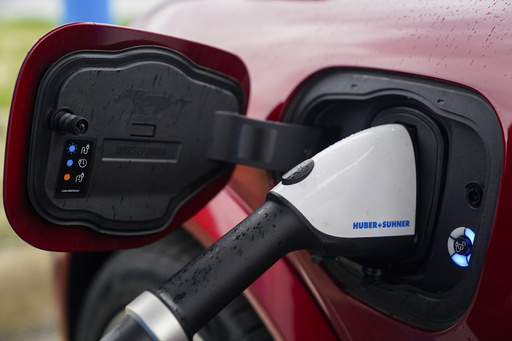DETROIT — The recent decision by former President Donald Trump’s administration to curtail the expansion of electric vehicle (EV) charging infrastructure in the United States has raised eyebrows among experts and industry leaders.
In a letter issued last Thursday, the administration advised states to cease spending funds allocated for EV charging projects, which were initially designated under former President Joe Biden’s administration. Trump has publicly criticized federal support for these charging stations, labeling it as “an incredible waste of taxpayer dollars.”
However, the Trump administration might require Congressional approval to fully implement this directive, and the likelihood of such an act seems uncertain. Industry advocates argue that consumer demand will continue to propel the growth of the charging network, independent of federal funding.
Tesla, led by CEO Elon Musk, a notable figure within Trump’s inner circle, has benefited significantly from the now-suspended funding program while maintaining a vast network of chargers nationwide. Tesla is expected to persist with its expansion plans regardless of federal financial support and may ultimately gain from reduced funding for its competitors.
Trump’s current stance on EV charging is a continuation of his previous actions, as he initially froze billions in funding for a comprehensive rollout of fast EV chargers on his very first day in office. Following this, the Federal Highway Administration, part of the U.S. Department of Transportation managing the National Electric Vehicle Infrastructure (NEVI) program, mandated states to halt their projects while new guidelines are developed. This move is part of a broader strategy aimed at dismantling numerous environmental policies and incentives introduced by the prior administration.
Several states, such as Alabama and Rhode Island, had already paused their respective programs following Trump’s inauguration order, but the recent directive signifies a stronger attempt to impede federal initiatives aimed at electrifying transportation and minimizing greenhouse gas emissions.
Currently, states that have launched NEVI-funded projects typically have received federal reimbursements, but the latest memo obstructs projects that are still in the planning or contracting phases, leaving states uncertain about their potential to resume operations and seek reimbursements.
The NEVI program was established through Biden’s Bipartisan Infrastructure Law of 2021 to address gaps in the EV charging network, particularly in underserved areas. Without this funding, private companies might hesitate to install chargers in low-traffic rural areas compared to bustling urban centers. Furthermore, NEVI aims to alleviate concerns about charging station accessibility during long road trips. The program allocated $5 billion to states over five years, though many have faced obstacles such as permitting issues and complicated electrical requirements. As of now, it is estimated that approximately $3.3 billion has already been distributed to states.
The recent announcement has introduced a degree of uncertainty, according to Ryan Gallentine, managing director at Advanced Energy United. He noted that most of the unallocated funding resides within state Department of Transportation accounts, ready for use. “States are not required to halt these projects solely based on this announcement,” Gallentine stated, urging state agencies to continue implementing the program until final guidance is provided.
Legal challenges are expected as a consequence of this development. Andrew Wishnia, a past deputy assistant secretary focused on climate policy within the DOT and a contributor to the NEVI program, remarked that there is no legal foundation for obstructing existing plans already approved and funded.
Despite the controversy, concerns regarding EV range continue to persist. Loren McDonald, chief analyst at Paren, emphasized that limited access to charging stations—whether at home, work, or along travel routes—could deter potential EV buyers. “If charging isn’t conveniently accessible, why would anyone opt for an electric vehicle?” he pointed out.
Remaining funds after states fulfill their highway commitments were intended to address other areas lacking in charging infrastructure, particularly in low-income neighborhoods and locations with numerous apartments where personal charging is impractical.
The federal initiative is not the sole effort to advance EV infrastructure across the country, as private companies have also invested significantly in this domain. Industry leaders believe that persistent demand for EV chargers will encourage increased installations. “While growth might slow slightly over the next four years, it is on an upward trajectory,” stated Bassem Ammouri, COO of EV Connect, a key player in the charging market.
Some industry advocates express concern that delaying essential charging infrastructure may adversely affect the broader transition to electric vehicles and consequently impact vehicle sales. “As the global market shifts towards electric vehicles, any slowdown puts the U.S. auto industry further behind,” cautioned Matt Stephens-Rich, director of programs at the Electrification Coalition.
This website uses cookies so that we can provide you with the best user experience possible. Cookie information is stored in your browser and performs functions such as recognising you when you return to our website and helping our team to understand which sections of the website you find most interesting and useful.
